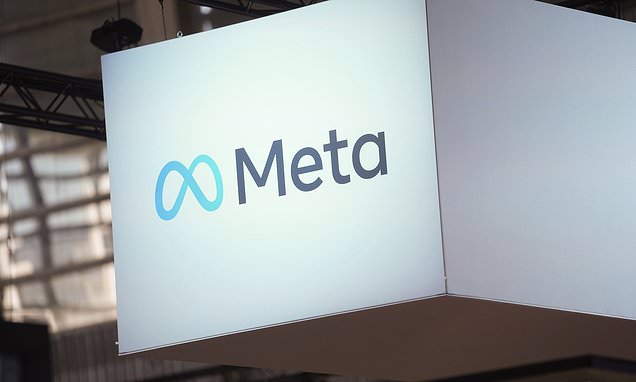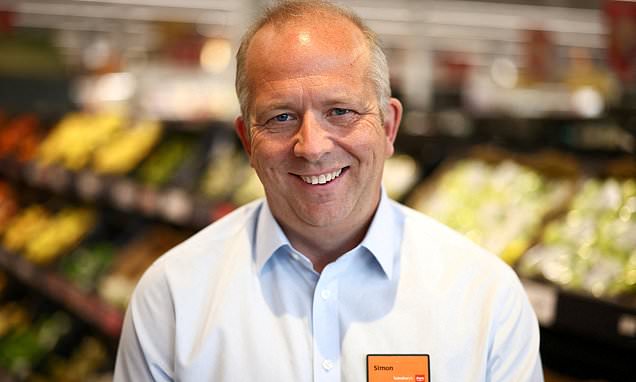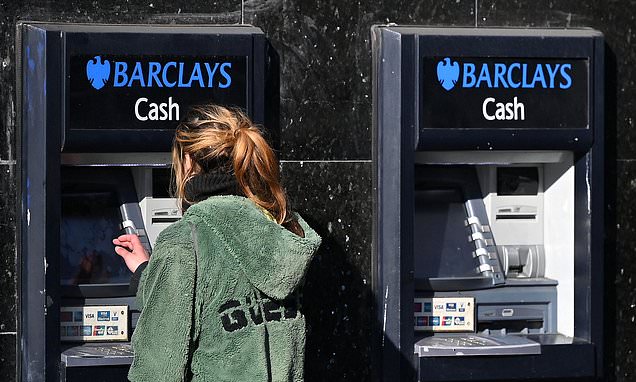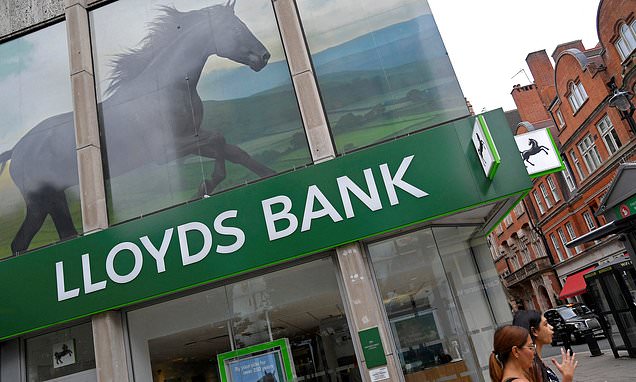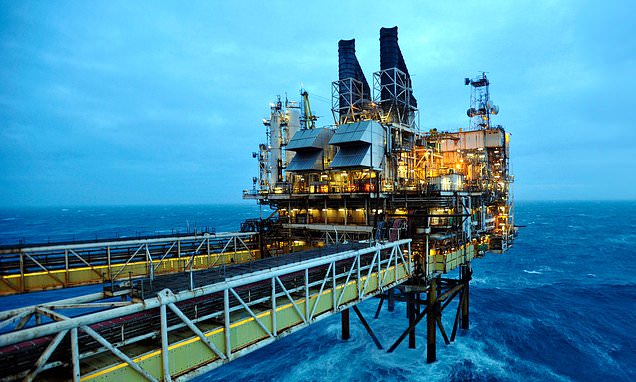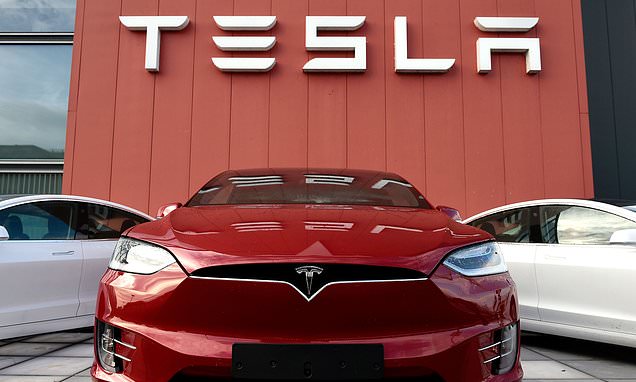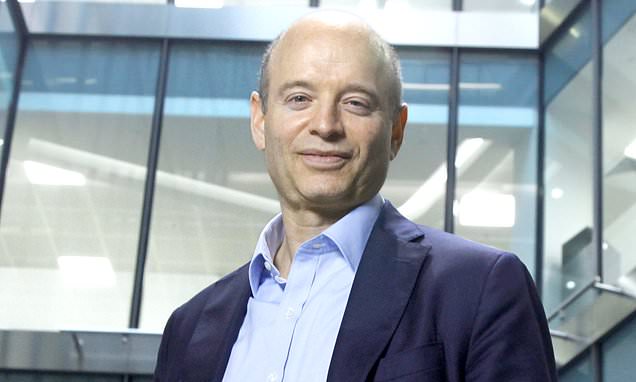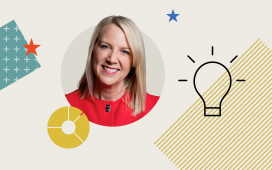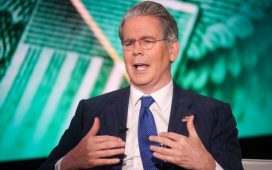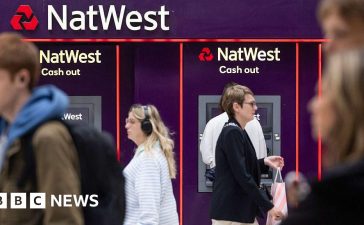Updated:
The FTSE 100 is up 0.6 per cent in early trading. Among the companies with reports and trading updates today are Barclays, Sainsbury’s, BHP, Anglo American, AstraZeneca, WPP and Persimmon. Read the Thursday 25 April Business Live blog below.
> If you are using our app or a third-party site click here to read Business Live
Meta announces it is to plough billions into artificial intelligence
Facebook owner Meta has posted its fastest sales growth in nearly three years – but shares fell as it ramps up spending on artificial intelligence.
In an announcement last night, the social media firm posted revenues of £29.2billion for the three months to the end of March, up 27 per cent from the year before.
Sainsbury’s enjoys food sales boost months amid 1,500 job cuts
Sainsbury’s expects to deliver ‘strong’ profit growth this year, driven by bumper food sales and a sharp focus on prices in a bid to help win customers from rivals.
The supermarket chain reported a better-than-expected 1.6 per cent increase in underlying pre-tax profits to £701million for the year to 2 March.
Barclays profits hit by subdued mortgage lending and lower customer deposits
Barclays has reported weaker profits for the start of the year, as mortgage lending and deposits slipped and its investment bank was squeezed by weaker corporate deal making.
The FTSE 100-listed lender said income from its UK operations fell 7 per cent year-on-year, amid subdued mortgage lending and ‘adverse deposit dynamics’.
Customer deposits slipped 2 per cent to £237.2billion, driven by lower customer account balances, which the bank said reflected broader consumer trends.
Market open: FTSE 100 up 0.6%; FTSE 250 down 0.5%
The FTSE 100 continues its ascent into new record highs this morning, as miner Anglo American surges on a buyout offer from BHP Group, while investors cheer bumper earnings from Unilever, AstraZeneca and Barclays.
Anglo American is up 12.7 per cent to a nine-month high after BHP said it made an offer to buy the London-listed miner, valuing its share capital at £31.1billion
The deal would create the world’s biggest copper miner with around 10 per cent of global output. BHP’s UK-listed stock is down 3.7 per cent in early trading.
AstraZeneca has gained 5.3 per cent after the drugmaker reported quarterly revenue and profit above market estimates buoyed by resilient demand for its oncology and rare blood disorder drugs.
Unilever is up 4.1 per cent after the consumer goods company reported first-quarter sales that grew by a better than expected 4.4% per cent as it won back shoppers who had traded down to cheaper products.
Barclays has climbed 3.1 per cent despite reporting a 12 per cent fall in first-quarter profit.
Lloyds cheers green shoots in housing market – but takes a profits hit
Lloyds delivered an upbeat assessment of the UK economy as it predicted a rise in house prices this year – but also revealed disappointing first-quarter profits.
Britain’s biggest mortgage lender thinks prices will rise 1.5 per cent in 2024, helped by lower interest rates.
That reverses a previous forecast of a 2.2 per cent fall. It also cut its forecast for unemployment and said customers were mostly coping with cost of living pressures.
‘Sainsbury’s has managed to wrestle back market share from rivals in unrelenting tug of war between the UK supermarkets’
Mark Crouch, analyst at eToro:
‘Sainsbury’s has arguably been guilty in the past of having its fingers in too many pies, allowing lower cost rivals to muscle in on market share.
‘However, after launching its “Food First ” strategy which has since evolved into “Next Level Sainsburys” earlier this year, a renewed focus was given to groceries, the Nectar loyalty card scheme and £1bn of cost savings.
‘This morning’s results indicate these innovations are beginning to bear fruit as the supermarket chain reported record volume growth, with grocery sales up 9.4% and expected to increase in the year ahead.
‘Over the last 12 months, Sainsbury’s has managed to wrestle back market share from rivals in what is an unrelenting tug of war between the UK supermarkets. Engaging in a delicate balancing act between pricing and profit, Sainsbury’s invested heavily in value to bring more of us back to do our weekly shop.
‘Nectar rewards have been at the heart of that push, saving customers £12 on a typical £80 shop.
‘The introduction of a £200m share buyback scheme is great news for shareholders that the company is moving in the right direction. And at a time when fallout from higher inflation continues to eat into household budgets, now more than ever, price and quality are paramount.’
‘Cost controls look to be making a difference for Barclays’
Matt Britzman, equity analyst, Hargreaves Lansdown:
‘Credit where it’s due, cost controls look to be making a difference for Barclays. First-quarter trading was better than expected, but the weaker net interest income guidance for 2024 will be a little disappointing.
‘In its UK arm, results were very similar to what markets heard from Lloyds yesterday. Structural hedge income is booming as lower-yield instruments are being reinvested at higher rates. That’s helping to offset ongoing weakness from depositors in search of better rates and a mortgage market that’s not as profitable as a few years ago. Both those headwinds are expected to ease throughout the year, and with loan default levels actually ticking down at the group level, there’s enough here to whet investors’ appetites.
‘Looking below the hood on defaults, Barclays has a big stake in both the UK and US card market which adds another angle. Over the pond, default levels surprised on the upside and are higher than back in the UK, with US consumers clearly feeling the pinch a tad more. This was one area that disappointed, but Barclays remains confident in its reserve levels and expects things to improve as the year progresses.
‘There’s a new strategy at play and plenty to like about the globetrotting operations. But markets are unlikely to fully reward the stock until it demonstrates sustained progress, especially in areas like investment banking where the US peer group is so strong.’
‘Solid start…but Unilever should be performing better’
Charlie Huggins, manager of the Quality Shares Portfolio at Wealth Club:
‘Unilever has got off to a solid start in 2024 with volume growth improving to 2.2%. As a result, it has reiterated its full year guidance.
‘However, Unilever should be performing better. Hein Schumacher’s ‘Action Plan’ is designed to reinvigorate performance through more impactful innovation, productivity savings and an improved culture, with an enhanced focus on the top 30 Power Brands.
‘While it is early days, there are already promising signs. The Power Brands are out-performing the rest of the portfolio, growing volumes by 3.8% in the first quarter. A greater focus on these seems eminently sensible. Meanwhile, the recently announced separation of the ice cream business shows Unilever’s CEO is willing to take bold steps to turn the company around, which is what Unilever desperately needs.
‘Ice cream is a lower margin business and has struggled recently, losing share to competitors. Separating out the ice cream business will simplify the group and free up resources to invest behind the biggest brands. It is all part of the new CEO’s master plan of doing “fewer things, better and with greater impact”.
‘Unilever will need more than portfolio change to deliver on its potential – cost of living challenges mean private label brands have never been more appealing. Nevertheless, the ‘Action Plan’ has got off to a good start and it finally feels like Unilever is moving in a positive direction.’
Windfall tax is driving UK oil and gas producers to Norway, says MAGGIE PAGANO
Serica Energy is one of Britain’s top ten oil and gas producers, which delivers around 41,000 barrels of oil a year.
Its portfolio of new projects includes the Buchan redevelopment – 120 miles north-east of Aberdeen – the third-biggest underdeveloped field in UK waters behind Rosebank and Cambo.
Its chairman and acting chief executive is David Latin, an industry veteran with more than 30 years of experience working in the upstream sector including senior roles at BP and the multinational oil giant, OMV Group, where he headed its Norwegian operations.
In other words, he knows his onions.
Unilever beats sales forecasts as consumer giant wins back customers
Unilever’s first-quarter sales rose by a better than expected 4.4 per cent, as one of the world’s biggest consumer goods groups won back shoppers who had traded down to cheaper products.
The maker of Dove soaps and Hellmann’s mayonnaise increased its sales volumes by 2.2 per cent, its second quarter of growth after several of declining volumes. It raised prices by 2.2 per cent.
Consumer goods companies are fighting to recover volumes lost after months of price increases introduced to pass higher input costs onto the customer. Prices had risen initially due to the Covid-19 pandemic, followed by Russia’s invasion of Ukraine.
Analysts had expected Unilever’s sales volumes to rise by 1.2 per cent and prices to increase by 1.8 per cent. Its underlying sales growth was above the 3 per cent estimate seen by the analysts in a company-provided consensus.
Unilever also maintained its full-year outlook and said it expects sales volumes to continue to improve.
‘We have increasing confidence in our ability to deliver sustained volume growth as we accelerate gross margin expansion,’ CEO Hein Schumacher said in a statement.
BHP eyes Anglo American for mining megadeal
London-listed miner Anglo American has received an all-share buyout proposal from BHP Group, lining-up a potential megadeal that would create the world’s biggest copper miner churning out around 10 per cent of global output.
The deal, if agreed, would also trigger further transactions in the global mining industry, which has seen a slew of mergers and acquisitions as companies review their assets to raise exposure to metals deemed critical to the energy transition.
The proposal comes after Anglo, which had a market capitalisation of $37.7billion as of Wednesday’s close, began a review of its assets in February after a 94 per cent plunge in annual profit and a series of writedowns due to a fall in demand for most of the metals it mines.
Anglo owns mines in countries including Chile, South Africa, Brazil and Australia.
BHP, the world’s biggest listed miner and best-known for mining iron ore, copper, coking coal, potash and nickel, had a market capitalisation of about $149billion as of Wednesday.
Tesla shares rocket after pledge to bring forward launch of ‘more affordable’ models
Tesla shares surged more than 12 per cent after it pledged to bring forward the launch of ‘more affordable’ cars.
The electric car maker said production could start this year, as the group run by tech billionaire Elon Musk suffered its biggest drop in revenue in over a decade as demand stalls.
On Tuesday it posted sales of £17billion for the three months to the end of March, a 9 per cent fall from the year before and the largest slump since 2012.
Profits fell 86 per cent to £910million compared to £6.4billion a year ago.
Sainsbury’s ups guidance
Sainsbury’s has forecast strong profit growth in its new financial year as Britain’s second biggest supermarket group beat guidance with a 1.6 per cent rise for 2023/24.
The group, which has a 15.3 per cent share of Britain’s grocery market trailing only Tesco, is getting success from a strategy of matching discounter Aldi’s prices on essential items and providing better prices for members of its Nectar loyalty scheme, financed by taking £1.3billion of costs out of the business over the last three years.
Underlying pre-tax profit was £701million in the year to 2 March – ahead of company guidance of £670million to £700million, and the £690million made in 2022/23.
Chief executive Simon Roberts said:
‘We said we’d put food back at the heart of Sainsbury’s and that’s what we’ve done. Our food business is firing on all cylinders.
‘We have the best combination of value and quality in the market and that’s winning us customers from all our key competitors, driving consistent volume market share growth as more customers choose us for their weekly shop and all their special occasions.
‘As we embark on our Next Level Sainsbury’s strategy, we’ll continue to make deliberate, balanced choices to support our customers, colleagues, communities and farmers.
‘The business has real momentum and we’re excited by our goal of making good food joyful, accessible and affordable for everyone, every day.”
Investors to vote on plans to double London Stock Exchange boss’s pay to £13m
The owner of London’s stock market is facing an investor backlash over plans to more than double its boss’s pay.
London Stock Exchange Group (LSEG) wants to up chief executive David Schwimmer’s maximum pay from £6.25million to £13million.
Investors will vote today on whether to allow the near-£7million pay rise, at the annual general meeting amid soul searching in the City over the health of the stock market over which Schwimmer presides.
Analysts warn that a ‘relentless’ wave of takeover activity, amounting to a ‘feeding frenzy’ on undervalued British stocks, has left the exchange facing ‘death by a thousand cuts’.
Barclays profits slip
Barclays profits slipped 12 per cent in the first quarter as a squeeze on UK mortgage pricing, lower income from trading and a drought of M&A fees showed the difficulties it will face in delivering its first strategic revamp in a decade.
The lender posted a pre-tax profit of almost £2.3billion for the three months to 31 March, down from £2.6billion a year earlier and in line with forecasts of £2.2billion.
Barclays is bidding to restore investor faith in its universal banking business model, after years of share price underperformance, clashes with activists over the role of its investment bank, and management turnover.
Boss C.S. Venkatakrishnan said:
‘We are focused on disciplined execution of the plan that we presented at our Investor Update on 20th February.
‘We have now announced the sale of our performing Italian mortgage book and are investing in our higher returning UK consumer businesses, including through the expected completion of the Tesco Bank acquisition in Q424.
‘We continue to exercise cost discipline and remain well capitalised with a Common Equity Tier 1 (CET1) ratio at the end of the quarter of 13.5%.’
Share or comment on this article:
BUSINESS LIVE: Barclays profits slip; Sainsbury’s ups guidance; BHP eyes Anglo American deal
Some links in this article may be affiliate links. If you click on them we may earn a small commission. That helps us fund This Is Money, and keep it free to use. We do not write articles to promote products. We do not allow any commercial relationship to affect our editorial independence.

